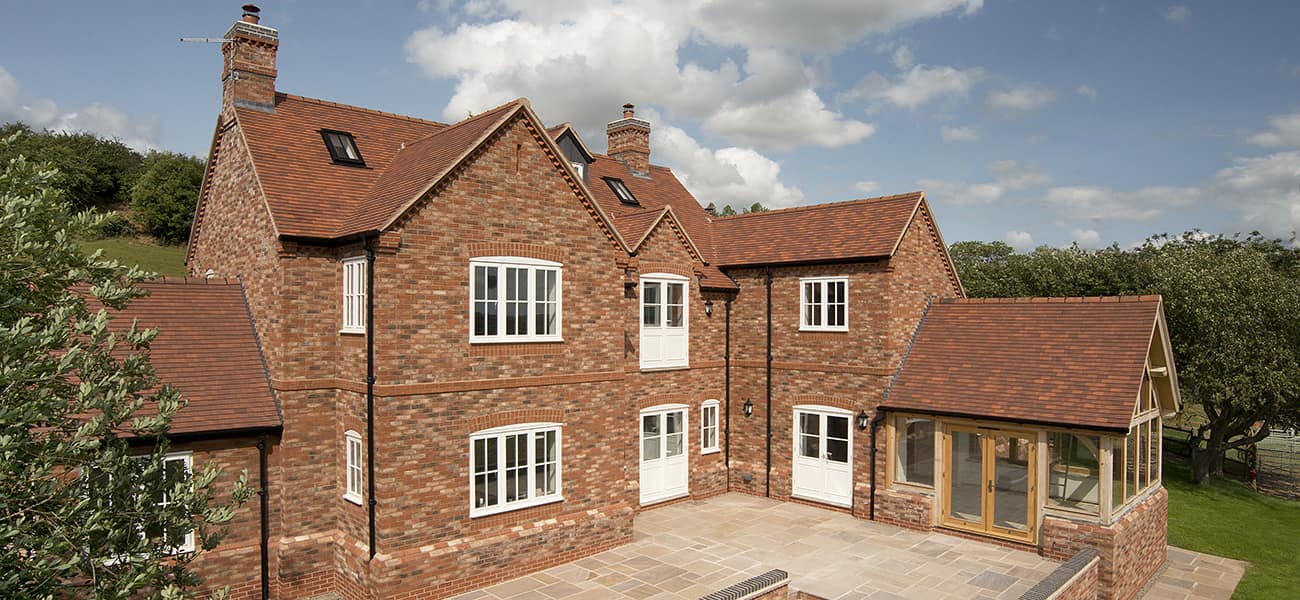What are the pitched roof systems available for housebuilding

What is the function of a pitched roof?
Like all buildings elements, a pitched roof has to do several things at once, contributing to the structural needs of the building while also helping to meet the comfort needs of the occupants.
The primary purpose of a roof is to shelter the building’s interior from the elements. Because of the volume of rainfall experienced in the UK, it’s important that the roof also drains effectively (which is why pitched roofs are usually preferred over flat roofs), and has the strength and durability to resist continual exposure to wind and rain.
Then there are aesthetics to consider too: the roof must fit in with surrounding styles or the local vernacular, potentially restricting the choice of materials.
What is a pitched roof system?
As aesthetics are often the primary driver for choosing a roof covering, and the covering is all that most people see, it can be easy to forget that a pitched roof is made up of many components beneath the surface.
Every single one of those components can be sourced individually. That may be a cost effective approach in terms of the basic price of each item, but it’s also time consuming and riven with uncertainty in terms of being able to prove that all of the components work properly and effectively when combined on any given project.
For example, use the right covering material at the wrong pitch and it can let rainwater in, which is at odds with the function of the roof. Use the right type of fixing but in insufficient quantity, and the covering might not stand up to strong winds.
Because the performance of one component is heavily reliant on so many others, the liability that any individual manufacturer might accept should a problem occur is extremely limited.
Manufacturers of some of the ‘bigger’ components in a roof therefore offer pitched roof systems - a collection of products they know to work well in combination and which they can typically offer with some guarantee or warranty attached as a result.
What types of pitched roof system are available?
Sometimes, the word ‘system’ might be applied to the rafters or trusses that form the structural framework of the pitched roof. Being integral to the stability of the building, they should be considered in isolation from the roof covering that they will support.
Outside of ‘conventional’ pitched roof construction, a system might also be a roof panel-type solution, largely manufactured offsite and craned onto the roof in sections.
Such solutions typically incorporate thermal insulation, in order to remove the need for fitting it on site (and therefore the issues that come with on site installation). The panel may be designed as a structural element too, or be fixed to the roof structure. Likewise, it may or may not incorporate the roof covering, depending on the solution being offered and the type of building it is designed for.
Thermal insulation is an important part of a pitched roof, reducing heat loss and helping buildings to meet energy efficiency targets. As a component of a conventional pitched roof, it generally works in isolation - it may be installed along the pitch of the roof or along the horizontal ceiling, and therefore has little or no impact on the choice of roof covering, or how the covering performs.
Some insulation manufacturers offer a ‘system’ featuring rigid insulation boards fixed as sheathing (i.e. in a continuous layer over the roof structure) and the underlay. The roof covering, however, must be sourced separately, installed as normal but fixed through the insulation layer into the roof structure.
What is the Marley pitched roof system?
The most widespread type of pitched roof system is one that concentrates on the roof covering, and is designed to be the most effective solution to fulfil those functional requirements of providing shelter and resisting the elements.
Marley’s pitched roof system is the leading example of this type. Tiles, tile battens, eaves ventilation, ridge ventilation, underlay, fixings and accessories - all are included in project-specific specifications, meaning every job can be approached with confidence.
Nothing is outsourced, meaning Marley’s system covers more critical roof components than any other, and all possible combinations of components are tested in-house, removing any uncertainty about the suitability of a solution. Available with a 15 year warranty, the copying of specifications from one project to another is eliminated, delivering peace of mind through the supply chain.
For more information, download the Roof Systems brochure, call our technical advisors on 01283 722588, or find your local Marley representative.
Category: Roofing